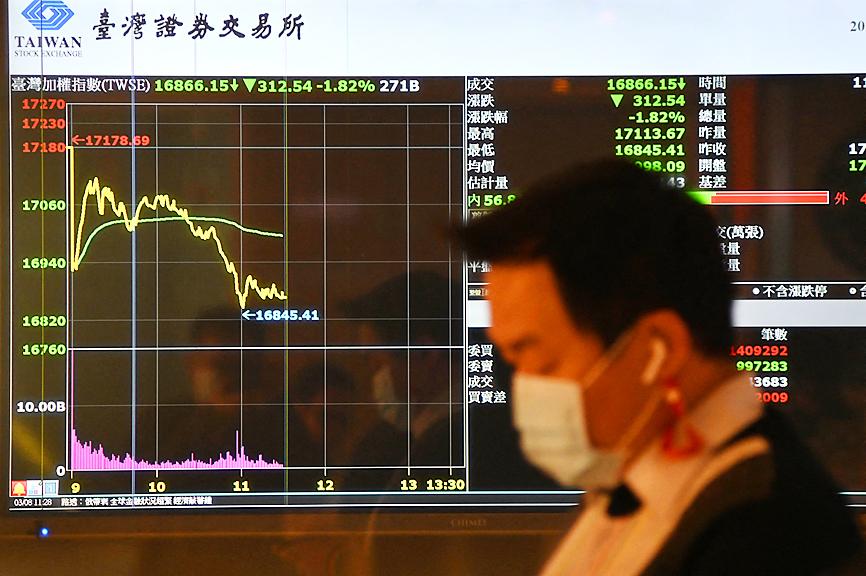Listed companies posted a combined profit of NT$1.27 trillion (US$43.62 billion) from their overseas investment last year, led by the shipping, semiconductor and electronic components sectors, the Financial Supervisory Commission (FSC) said on Tuesday.
Last year’s figure represents an increase of NT$638 billion from 2020 and is the highest over the past decade.
Shipping companies reported combined gains of NT$427.3 billion from overseas investments, compared with NT$50.5 billion a year earlier, thanks to higher freight rates, the commission said.

Photo: Sam Yeh, AFP
Electronic component makers followed with investment gains of NT$163.2 billion, up 30.14 percent from NT$37.8 billion a year earlier, due to higher smartphone sales, while semiconductor companies ranked third with gains of NT$106.2 billion, up 135.48 percent from NT$45.1 billion.
Listed companies’ accumulated overseas investments had risen NT$342 billion to NT$7.15 trillion by the end of last year, a record high, the commission said, adding that most investments were for mergers and acquisitions, or the expansion of foreign units.
A total of 1,281 listed companies had invested overseas as of the end of last year, unchanged from a year earlier, the commission said.
Listed companies also registered a record profit of NT$552.3 billion from their investment in China, up 23.8 percent from NT$445.9 billion a year earlier and the highest level in 10 years, the commission said.
Electronics manufacturers posted the highest investment gains in China last year with NT$174.2 billion, an annual growth of 30 percent, followed by semiconductor firms with NT$51.4 billion, up 47 percent annually, and plastic makers with NT$39.2 billion, up 85 percent year-on-year, the commission said.
A total of 1,208 companies invested in China last year, nine more than a year earlier, with investments rising NT$17 billion from 2020.
Separately, four life insurers have applied to distribute total cash dividends of NT$30 billion this year, with several others likely to follow suit in the near term, the commission said on Thursday.
Cathay Life Insurance Co (國泰人壽) has applied to distribute cash dividends of NT$23.9 billion and Taiwan Life Insurance Co (台灣人壽保險) proposed to distribute NT$4.6 billion, while Farglory Life Insurance Co (遠雄人壽) and PCA Life Assurance Co Ltd (保誠人壽) plan to distribute a combined NT$1.5 billion, the commission said.
Fubon Life Insurance Co (富邦人壽), Nan Shan Life Insurance Co (南山人壽) and China Life Insurance Co (中國人壽) have said that they plan to offer shareholders cash dividends this year.
The commission last year approved five insurers’ plans to distribute a total cash dividend of NT$11.5 billion, higher than the NT$5 billion approved a year earlier.
Six major life insurers reported combined net profit of NT$338.7 billion for last year, which was 78 percent higher than a year earlier and the highest of all time.

Taiwan would remain in the same international network for carrying out cross-border payments and would not be marginalized on the world stage, despite jostling among international powers, central bank Governor Yang Chin-long (楊金龍) said yesterday. Yang made the remarks during a speech at an annual event organized by Financial Information Service Co (財金資訊), which oversees Taiwan’s banking, payment and settlement systems. “The US dollar will remain the world’s major cross-border payment tool, given its high liquidity, legality and safe-haven status,” Yang said. Russia is pushing for a new cross-border payment system and highlighted the issue during a BRICS summit in October. The existing system

Taiwan Semiconductor Manufacturing Co (TSMC, 台積電) is expected to grow its revenue by about 25 percent to a new record high next year, driven by robust demand for advanced technologies used in artificial intelligence (AI) applications and crypto mining, International Data Corp (IDC) said yesterday. That would see TSMC secure a 67 percent share of the world’s foundry market next year, from 64 percent this year, IDC senior semiconductor research manager Galen Zeng (曾冠瑋) predicted. In the broader foundry definition, TSMC would see its market share rise to 36 percent next year from 33 percent this year, he said. To address concerns

Intel Corp chief financial officer Dave Zinsner said that a formal separation of the company’s factory and product development divisions is an open question that would be decided by the chipmaker’s next leader. Zinsner, who is serving as interim co-CEO following this month’s ouster of Pat Gelsinger, made the remarks on Thursday at the Barclays technology conference in San Francisco alongside co-CEO Michelle Johnston Holthaus. Intel’s struggles to keep pace with rivals — along with its deteriorating financial condition — have spurred speculation that the next CEO would make dramatic changes. That has included talk of a split of the company’s manufacturing

PROTECTIONISM: The tariffs would go into effect on Jan. 1 and are meant to protect the US’ clean energy sector from unfair Chinese practices, the US trade chief said US President Joe Biden’s administration plans to raise tariffs on solar wafers, polysilicon and some tungsten products from China to protect US clean energy businesses. The notice from the Office of US Trade Representative (USTR) said tariffs on Chinese-made solar wafers and polysilicon would rise to 50 percent from 25 percent and duties on certain tungsten products would increase from zero to 25 percent, effective on Jan. 1, following a review of Chinese trade practices under Section 301 of the US Trade Act of 1974. The decision followed a public comment period after the USTR said in September that it was considering